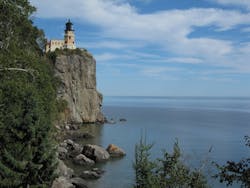A new study of groundwater use involving White Bear Lake shows residential irrigation and other groundwater uses have little impact on the lake level in the long term, according to the Minnesota Department of Natural Resources (DNR).
According to Minnesota Public Radio (MPR), the study’s findings were released Oct. 17 as the Minnesota Court of Appeals weighs a years-long lawsuit by White Bear Lake residents.
The homeowners had sued and previously won, saying the agency was not doing enough to keep groundwater pumping from contributing to drops in the lake’s water level.
Last year, Margaret Marrinan, Ramsey County District Court judge, ruled that the DNR had to cut groundwater use, better police permitted wells and come up with alternate sources for municipal water to keep the lake from dropping more.
By releasing this study, DNR acknowledged the wells in the region have an impact on the lake levels. However, the study also indicates factors, like rainfall, evaporation and other weather phenomena are significant factors, as well.
"Groundwater use from existing permits does contribute. It’s not the sole cause, but it does contribute to the lake falling below its protective elevation on occasion," said Barb Naramore, assistant DNR commissioner to MPR. "That's not a violation of the sustainability standard, but is something that is of interest and concern to the department, and something we will be working with those permit holders to evaluate ways we may be able to address."
According to MPR, Naramore estimated the effect at maximum to be about 3 ft. The lake’s surface level has varied by about 6 ft.
The study also found a controversial element of the court decision from last year that proposed a residential water ban when the lake reached a certain level. This proposal said it “would have had a significant effect on water levels in White Bear Lake.” Lawmakers put a temporary prohibition on the irrigation ban over the spring, as the lawsuit made its way through the state’s appeal system.
"Folks may think we have a motivation behind our analysis," Naramore said to MPR. "We do not. We have the very best groundwater modeling talent working on this. We feel very confident about the conclusions we've reached."
The DNR does have a “protective elevation” set, at 922 ft above seal level, for the lake. According to Naramore, the agency has an interest in maintaining water quality and keeping the lake suitable for recreational uses. She also said some of the variation in the levels that alarmed residents are beneficial to the lake’s ecosystem long term.
